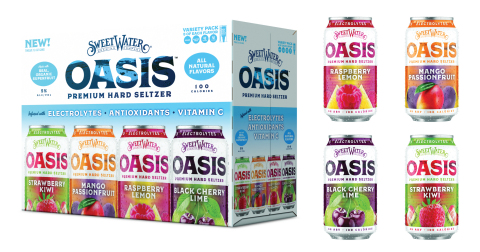Fresh & Tasty New Craft Hard Seltzer Features Electrolytes, Antioxidants and Vitamin C from Organic Superfruit Additions
SweetWater Brewing Company (" SweetWater ") today announced the introduction of a refreshingly tasty spin on hard seltzer with Oasis® Premium Hard Seltzer. Hitting shelves later this week, Oasis® hard seltzers are an easy-drinking, super-premium liquid made with real organic superfruit that's a step up from traditional hard seltzer brands. Four lip smacking variants of Oasis® will be available in 12oz can variety packs, each featuring dual fruit combo flavors for a more delicious taste profile: Raspberry-Lemon, Strawberry-Kiwi, Mango-Passionfruit, and Black Cherry-Lime. Each variant has only 100 calories, 1g carbs, 1g sugar and 5% ABV.
This press release features multimedia. View the full release here: https://www.businesswire.com/news/home/20210125005211/en/

Four lip-smacking variants of Oasis® will be available in 12oz can variety packs, each featuring dual fruit combo flavors for a more delicious taste profile: Raspberry-Lemon, Strawberry-Kiwi, Mango-Passionfruit, and Black Cherry-Lime. (Photo: Business Wire)
"SweetWater has always been at the forefront of delivering innovative beers for the craft brewing industry, and now we're bringing that expertise to hard seltzer. We knew our consumers were looking for a step up from other hard seltzers and our brewers knocked it out of the park with this great tasting, super-premium liquid," says Freddy Bensch, Founder and CEO of SweetWater Brewery.
SweetWater's Oasis® brand provides a light, bright, and vibrant taste with the right amount of sweetness, a sparkling effervescence and a hint of dual fruit flavors that offer a noticeably clean finish and great taste for a premium seltzer experience. Infused with electrolytes from potassium salt additions, antioxidants and vitamin C derived from organic superfruit ingredients, Oasis® hard seltzers create a better overall beverage that today's active lifestyle consumer is looking for. The result is a great-tasting, easy-drinking, perfectly balanced, and clean finishing beverage for any occasion that appeals to the hard seltzer adorer, craft beer aficionado, or domestic/import beer drinker.
The release of the Oasis® hard seltzers represents SweetWater's reinvigorated brand expansion into the rapidly growing hard seltzer category, which is being fueled by millennials, an important demographic for its growing beverage offering and innovation pipeline. As such, SweetWater surveyed craft beer and seltzer drinkers aged 21 to 44, with a focus on the millennial segment, to identify and hone a flavor profile that would resonate with the target audience.
"We used a combination of science and good old-fashioned conversation to determine what our fans wanted in a seltzer. Oasis® brand was born in our taproom with our consumers, and we believe this collaboration has produced a premium seltzer that's head and shoulders above anything else in the market," says Mark Medlin, BrewMaster. "Oasis® brand delivers an exciting blend of ingredients we know consumers are going to love."
Oasis® brand hard seltzers represent a key milestone in continuing SweetWater's reputation for innovation and staying at the forefront of the beverage industry with craft and consumer trades, which its loyal and growing consumer base has come to expect from the SweetWater® brand.
Hard seltzers have become an extremely popular choice for adults at play, whether it's the golf course, rec league sports, tailgating or post-gym. With its complex yet refreshingly, fruity flavors, Oasis® brand is built for the "adult recess" lifestyle – out on the boat, a summer afternoon sitting at the beach after a volleyball game, as a go-to-beverage for backyard games at a party with friends and family, or of course, your headiest music festivals.
Fast Facts:
100 calories, 1g carbs, 1g sugar, 5% ABV
Vegan Gluten Free Ingredients
Fermentable Ingredients: Pure Cane Sugar, Organic Superfruit
Packaging: 12 oz can,12 pack, Variety Pack
Find beers available where distributed .
About SweetWater Brewing Company
SweetWater Brewing Company is an Atlanta-based craft brewery living by the motto "Don't Float the Mainstream!" In 2020 SweetWater became a wholly owned subsidiary of Aphria Inc., (TSX: APHA and Nasdaq: APHA), a leading global cannabis company inspiring and empowering the worldwide community to live their very best life. SweetWater Brewing Co. celebrated 23 years of heady brews in 2020 and is a top 15 craft brewery in the nation, according to Brewers Association. The award-winning lineup of year-round beers includes 420® Extra Pale Ale, H.A.Z.Y®. IPA, IPA, High Light Low Cal IPA, G13 IPA, Trainwreck® Double IPA, Goin' Coastal® IPA with pineapple, and Blue blueberry wheat ale. Additionally, seasonal releases offer palate pleasing variety, along with an experimental, in-and-out limited release Dank Tank series, 420 Strain Series and progressive barrel aged styles in The Woodlands Project series.
SweetWater is passionate about protecting natural resources and habitats and is recognized for its contributions to environmental initiatives throughout its distribution footprint. Supporting the conservation of some of the nation's most threatened rivers, streams and coastlines is a cause near and dear to the brewery, as clean water is also vital to the creation of their tasty brews. Visit SweetWater Brewery – located at 195 Ottley Drive in the heart of Atlanta – for tours of the main brewery, and pints and bites in the newly renovated taproom and restaurant. For more information about SweetWater Brewing Company and brewery hours, please visit www.sweetwaterbrew.com . Follow SweetWater Brewing Company on Twitter/ Instagram @sweetwaterbrew, and become a fan at facebook.com/sweetwaterbrew .
View source version on businesswire.com: https://www.businesswire.com/news/home/20210125005211/en/
Kathleen Porter
630.664.2267
kathleen.porter@wyecomm.com